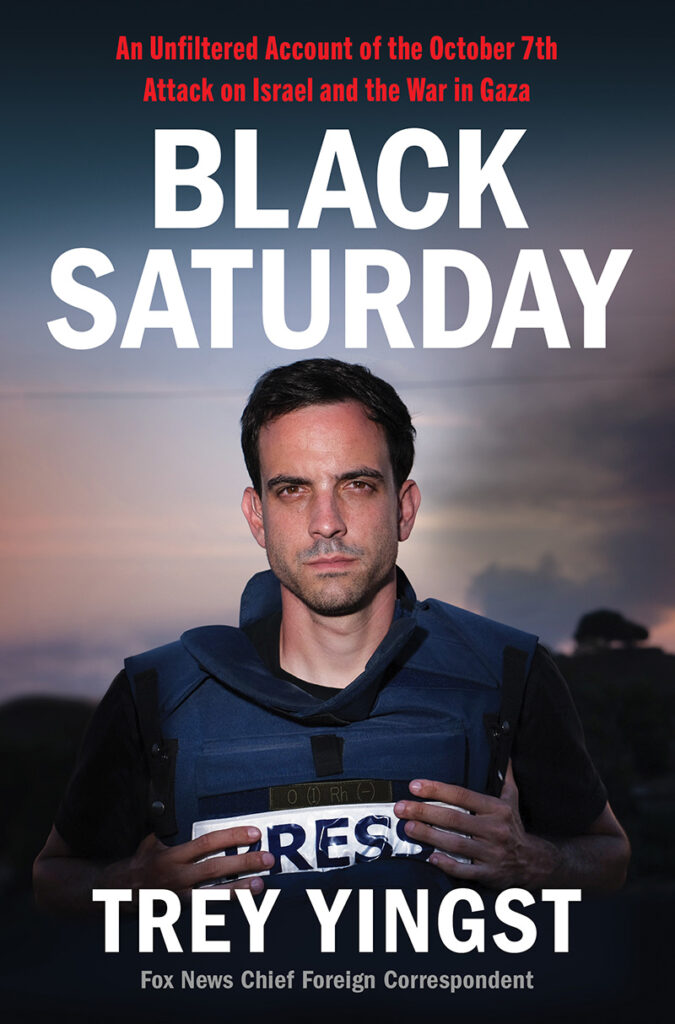
With the anniversary coming up people should remember those killed, but also the hostages still held. It is reminder of the continuing war waged against Israel that has been called the Holocaust of the 21st Century.
The book has a very potent quote, “The victims had nowhere to hide. Hamas was gunning them down for sport. Some young women who couldn’t outrun the attackers were raped and executed,” and mutilated. It is not Israel that is committing genocide but Hamas who kills horrifically, uses their own people as human shields, and builds tunnels under their own hospitals.
As Sheryl Sandberg said, “Silence is complicity, and in the face of terror, we cannot be quiet.” Trey Yingst has not stayed silent by writing his book. Combining candor, grit, and veracity, Yingst paints a vivid picture of horrors and violence, matched by acts of courage and humanity that cut through the darkness. Below is the interview with him.
Elise Cooper: How did you get the original assignment to cover Israel?
Trey Yingst: In college I co-founded a company called News Share, where we sold videos of war zones. This is how I got my start in journalism. At the age of twenty I went into the Gaza Strip and Jerusalem to report on the 51-day war between in Israel and Hamas. While studying at American University I also went into Ukraine and Africa. I was exposed to the world of being a foreign correspondent while still a student. Fox News hired me as a foreign correspondent. I have been sourcing in Israel and Gaza for the past six years, since I have been at Fox.
EC: How did you find out about the Hamas attack?
TY: When October 7th happened, it was a complete surprise to everyone. At 7:03 AM I received a call from my producer who told me ‘Something is happening in the South.’ We assumed it must be rocketing blasts. The protocol was reporting from a town along the border, Sderot. As the day developed, we understood it was not a rocket attack but an infiltration into Israel. This is the first chapter in the book.
EC: Did you see the horrifying atrocities?
TY: I reported all over the world including in Ukraine when the Russians invaded. October 7th stands out in my mind because what was seen was so horrific. There were places we were going into like Kibbutz Be’eri where we had to watch where we stepped to make sure we did not trip over bodies. I also reported outside the police station in Sderot. When reporting live under fire, there was shrapnel raining down on us. We were the only media station there where bodies were being pulled out of the rubble. The closeness of it all was a challenge in the reporting. I and the team were focused on the mission.
EC: What did you see as your mission?
TY: Get the information out to the Fox audience. We saw a lot of horrific scenes and interviewed a lot of First Responders. In the book I spoke with someone, Benzi, who was a reservist in the army. His job changed overnight to identifying bodies at the base the Israels used to identify the victims to give families closure. We saw houses stained with blood.
EC: What is your focus?
TY: To ensure we are telling the stories of civilians, the events that happened on October 7th, and the war in Gaza. For example, how the first responders felt in collecting the bodies killed on that day. My focus was always on the journalism, to get the live reports out.
EC: As a war journalist did you have personal emotional reactions?
TY: I have been very public that I have struggled with nightmares about what I have seen, not just in Israel, but in Ukraine. This is challenging to process. When it comes to mental health, I hope to be an advocate for those who are too shy to speak of it. My hope is that people find healthy ways to handle their emotional stress. The way I deal with nightmares and flashbacks to these events is to exercise and cold exposure.
EC: Did you speak with the players?
TY: I spoke with Israel’s Defense Minister, Yoav Gallant, and senior Hamas leadership exclusively. These relationships are based on trust and the knowledge that I am a straight shooter. I am there to get the facts and information.
EC: Why the title as Black Saturday?
TY: There was a consensus of those interviewed that this is the darkest day in Israel’s history, Saturday, the day of rest for the Jewish people. People referred to it as ‘Black Saturday,’ while others called it the ‘Black Sabbath.’ The book has a lot of coverage of what happened on October 7th from my perspective, Israeli soldiers, hostages, and Israeli law enforcement. The book also covers the first two months of the war as I spoke with Palestinian doctors.
EC: What do you want your readers to get out of the book?
TY: Besides what I experienced; what others experienced. For example, those who had to collect bodies at the Music Festival or a commander sent to the South, a Lt. Colonel in the Israeli army. I went on an imbed into Gaza with him and his unit. He thought he was ordered there to defend the border but the first thing his unit had to do is to pick up the bodies on the road. I hope that readers understand that everyone in Israel has a similar experience of trauma. War is horrific and as a journalist my responsibility is to provide clarity during war, even though it is complex and challenging. My objective with the book is to make sure people do not forget about October 7th and to cover the human stories.
THANK YOU!!
